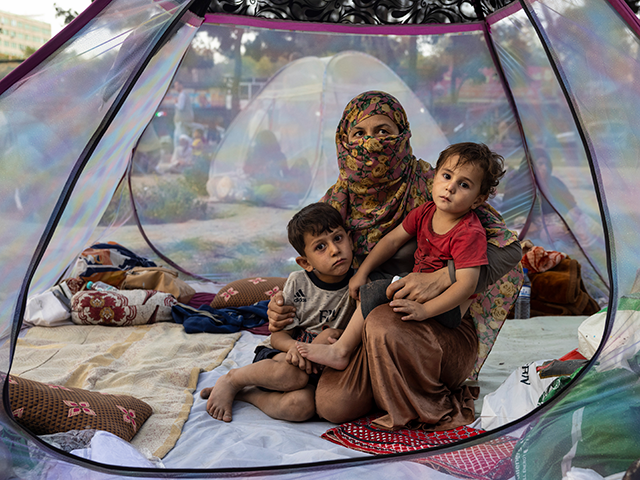Food supplied to Afghanistan by the United Nations (U.N.) World Food Programme may run out by the end of September, Ramiz Alakbarov, a U.N. humanitarian coordinator in Afghanistan, warned Wednesday.
“Food stocks in Afghanistan could run out as soon as this month,” Alakbarov told reporters in the Afghan national capital, Kabul, on September 1.
“For us to keep the current demand, we need at least $200 million only for the food sector, to be able to provide food to the most vulnerable,” he added.
The World Food Programme relies on donations from foreign governments to provide aid to starving populations, such as that of Afghanistan. Alakbarov said Wednesday the U.N. “is set to issue a flash appeal for Afghanistan in the coming days” in an effort to fundraise the $200 million sum needed to sustain the country’s food supply.
The U.N.’s food assistance agency has provided 600 metric tons of food to Afghanistan via delivery trucks in recent days. The World Food Programme directed the supply trucks to drive into Afghanistan via its land border with Pakistan, according to U.N. News.
Millions of families in #Afghanistan need our help right now! We’ve seen what happens when we turn our backs on innocent people struggling with hunger.
No food = no stability. pic.twitter.com/PCe9tbe9DP
— David Beasley (@WFPChief) September 1, 2021
The Taliban terror group deposed Kabul’s U.S.-backed government on August 15, declaring full control over all of Afghanistan. The takeover plunged the country into a state of economic chaos, fueling inflation for basic food items.
Responding to Kabul’s seizure, the U.S. government blocked the Taliban’s access to “virtually all of the Afghanistan central bank’s $9 billion in reserves, most of which are held in the U.S.,” Deutsche Welle (DW) reported August 24. The International Monetary Fund (IMF) also suspended Afghanistan’s access to its funds in the days immediately following August 15. Both actions caused Afghanistan to suffer from an acute shortage of U.S. dollars.
“With no new shipment of dollars arriving to shore it up, the local currency, afghani, has crashed to record lows, sending prices soaring. Prices of staples like flour, oil and rice have risen by as much as 10 percent-20 percent in a few days,” DW noted on August 24.
Afghanistan’s economic turmoil seriously threatens many Afghans’ already tenuous food access. An estimated 18 million people in the country, roughly half of Afghanistan’s population, “depended on emergency aid to meet their basic needs” before the country’s “current upheaval,” U.N. News reported on Wednesday, referring to the Taliban’s recent toppling of Kabul.
The U.N. had already attempted to fundraise about $1.3 billion in funding for aid to Afghanistan this year, but “has so far netted less than $400 million,” according to the report.
Afghanistan’s food woes are further complicated by an ongoing drought across the country’s northern and western regions that had already reduced its national food production prior to the Taliban’s takeover of Kabul last month. A deficit of snow and rainfall has left “fields of dust” across Afghanistan’s northern city of Mazar-i-Sharif and its western city of Herat, World Food Programme Country Director for Afghanistan Mary-Ellen McGroarty told Reuters on September 2.
World Food Programme Executive Director David Beasley met with the Taliban’s chief spokesman, Suhail Shaheen, in Doha, Qatar, on August 26 to discuss Afghanistan’s ongoing drought and worsening food crisis. Shaheen tweeted that he discussed with Beasley “humanitarian issues and ongoing situation of Afghanistan including problems emerged as a result of drought [sic].”
1/2
Sher M. Abbas Stanikzai, Deputy Director, PO and his accompanying delegation met with David Beasley, Executive Director of WFP and his delegation in Doha. They discussed humanitarian issues and ongoing situation of Afghanistan including problems emerged as a result of drought— Suhail Shaheen. محمد سهیل شاهین (@suhailshaheen1) August 26, 2021
Beasley confirmed to the U.S. Public Broadcasting Service (PBS) on August 31 he “negotiated with Taliban leaders in Qatar … over the continuation of aid” on August 26.
“This fall, we’re very concerned because we’re running out of money and the winter months are coming, and we have got to preposition food [sic],” the World Food Programme chief said in an interview with PBS News Hour, echoing his agency’s repeated statements regarding insufficient funding.
“You know, it’s been an interesting time, because the Taliban have been assuring us that they want us to continue,” Beasley said elsewhere in the interview, expressing optimism that the Taliban will continue to allow the U.N. to provide food aid to Afghanistan moving forward.
Other U.N. agencies, such as the United Nations Children’s Fund (UNICEF), have similarly expressed hope to continue working in Afghanistan by collaborating with the Taliban. Mustapha Ben Messaoud, the chief of Afghanistan field operations for UNICEF, told reporters on August 17 he remained “quite optimistic” about working with the jihadist group because its leaders allegedly “expressed support” for girls’ continued attendance of public school. The Taliban previously banned girls and women from attending school or working during its previous rule over Afghanistan from 1996-2001.

COMMENTS
Please let us know if you're having issues with commenting.